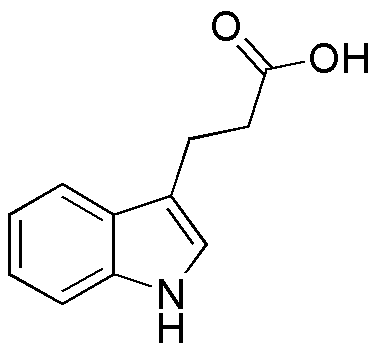Indole-3-propionic acid is widely utilized in research focused on:
- Neuroprotection: This compound has shown potential in protecting neurons from oxidative stress, making it a candidate for developing treatments for neurodegenerative diseases like Alzheimer's and Parkinson's.
- Plant Growth Regulation: Indole-3-propionic acid can enhance plant growth and development, acting as a natural growth regulator. This application is particularly beneficial in agriculture to improve crop yields.
- Antioxidant Properties: Its ability to scavenge free radicals makes it useful in formulating dietary supplements aimed at reducing oxidative damage in the body, appealing to health-conscious consumers.
- Pharmaceutical Development: Researchers are exploring its role in drug formulations, particularly in enhancing the bioavailability of certain medications, which can lead to more effective treatments.
- Food Preservation: Due to its antioxidant properties, it can be used in food products to extend shelf life and maintain quality, offering food manufacturers a natural alternative to synthetic preservatives.
Información general
Propiedades
Seguridad y normativas
Aplicaciones
Indole-3-propionic acid is widely utilized in research focused on:
- Neuroprotection: This compound has shown potential in protecting neurons from oxidative stress, making it a candidate for developing treatments for neurodegenerative diseases like Alzheimer's and Parkinson's.
- Plant Growth Regulation: Indole-3-propionic acid can enhance plant growth and development, acting as a natural growth regulator. This application is particularly beneficial in agriculture to improve crop yields.
- Antioxidant Properties: Its ability to scavenge free radicals makes it useful in formulating dietary supplements aimed at reducing oxidative damage in the body, appealing to health-conscious consumers.
- Pharmaceutical Development: Researchers are exploring its role in drug formulations, particularly in enhancing the bioavailability of certain medications, which can lead to more effective treatments.
- Food Preservation: Due to its antioxidant properties, it can be used in food products to extend shelf life and maintain quality, offering food manufacturers a natural alternative to synthetic preservatives.
Documentos
Hojas de datos de seguridad (HDS)
La SDS proporciona información de seguridad completa sobre la manipulación, el almacenamiento y la eliminación del producto.
Especificación del producto (PS)
La PS proporciona un desglose completo de las propiedades del producto, incluida la composición química, el estado físico, la pureza y los requisitos de almacenamiento. También detalla los rangos de calidad aceptables y las aplicaciones previstas del producto.
Certificados de análisis (COA)
Busque certificados de análisis (COA) ingresando el número de lote del producto. Los números de lote y de partida se pueden encontrar en la etiqueta de un producto después de las palabras "Lote" o "Lote".
Número de catálogo
Número de lote/lote
Certificados de origen (COO)
Este certificado de origen confirma el país en el que se fabricó el producto y también detalla los materiales y componentes utilizados en él y si se deriva de fuentes naturales, sintéticas u otras fuentes específicas. Este certificado puede ser necesario para cumplir con las normativas aduaneras, comerciales y regulatorias.
Número de catálogo
Número de lote/lote
Hojas de datos de seguridad (HDS)
La SDS proporciona información de seguridad completa sobre la manipulación, el almacenamiento y la eliminación del producto.
DownloadEspecificación del producto (PS)
La PS proporciona un desglose completo de las propiedades del producto, incluida la composición química, el estado físico, la pureza y los requisitos de almacenamiento. También detalla los rangos de calidad aceptables y las aplicaciones previstas del producto.
DownloadCertificados de análisis (COA)
Busque certificados de análisis (COA) ingresando el número de lote del producto. Los números de lote y de partida se pueden encontrar en la etiqueta de un producto después de las palabras "Lote" o "Lote".
Número de catálogo
Número de lote/lote
Certificados de origen (COO)
Este certificado de origen confirma el país en el que se fabricó el producto y también detalla los materiales y componentes utilizados en él y si se deriva de fuentes naturales, sintéticas u otras fuentes específicas. Este certificado puede ser necesario para cumplir con las normativas aduaneras, comerciales y regulatorias.


